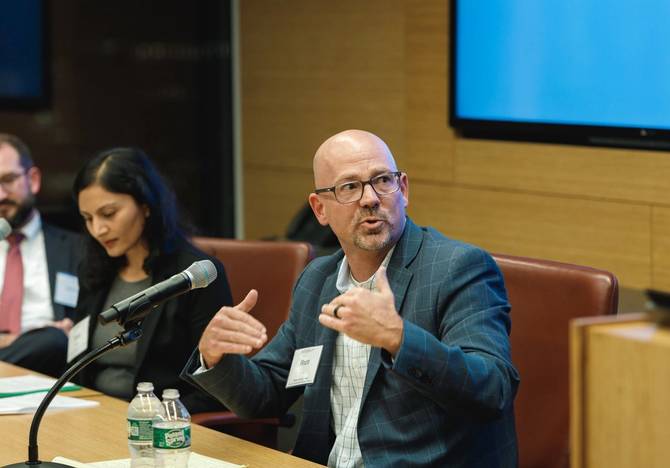Hey, hey, hey, it’s the last day of Q1. You made it! These past few months were a bit choppy, huh? Thankfully, it looks like nothing but smooth sailing from here. Yep, there is no doubt that a dazzling new quarter of market stability and robust profitability begins on Monday. Q2, new you!
In this issue:
 Making moves Making moves
 One standard proposal One standard proposal
 Dank of America? Dank of America?
— Drew Adamek, Leonard Robinson, Andrew Adam Newman
|
|
Atakan/Getty Images
Oh boy, it seems like we’ve been six months away from a recession for at least 18 months now and it’s still not clear if and when we’re going to see the economy turn sour. But no matter what happens with the macroeconomy, companies still need to hire (and fire) CFOs.
Hut, hut, hire. Christine Dorfler became the National Football League’s CFO after the departure of Joe Siclare, who was recently promoted after 11 years in the role. Dorfler, a US Army veteran and alum of two Division I institutions, certainly isn’t a newbie to the rough and tumble of the sports business. She’s been NBC Sports Group’s CFO since 2019. While there, she helped structure a new broadcast rights deal with the PGA tour.
Salary: TBA
This new CFO may have some questions for the Oracle of Omaha. Online bank Ally Financial has tapped Russell Hutchinson as its new CFO, amid rumors that Warren Buffet is eying the bank as a takeover target. Hutchinson has worked with Ally as an outside consultant and Ally CEO Jeffrey Brown called Russell as one of his “most reliable and trusted outside advisors.”
Hutchinson was chief operating officer for global mergers and acquisitions at Goldman Sachs after more than two decades in the group’s investment banking division advising speciality finance companies, including Ally.
Bradley Brown, Ally’s interim CFO, will return to his role as corporate treasurer after Hutchinson takes over.
Salary: $750,000 base
OK, so we’re still workshopping jokes about either delivering the goods or rolling in the dough, but the key takeaway while we come up with something witty is that Papa John’s, a pizza chain named for scandal-prone co-founder John Schnatter that has more than 3,000 stores nationwide, is searching for a new CFO after the departure of Ann Gugino.
Keep reading.—DA/LR
|
|
|
Join the club. A whopping 75.7% of online shopping carts are abandoned, often from window-shoppers and checkout-ghosters. Never fear, merchants. Bolt’s How To Create Lifetime Customers Report is here to end those abandoned cart woes.
Let’s start with how to convert shoppers into lifetime customers. Bolt found that by making it easier for shoppers to log in to their accounts, retailers can eliminate barriers to checkout and reduce cart abandonment.
And shoppers get a better experience—one that’ll inspire them to return again and again.
Don’t let abandoned carts get in the way of your conversion ghouls. Get the full scooOOoop on creating lifetime customers in the report.
Be gone, checkout-ghosters!
|
|
Getty Images
How organizations, especially finance departments, interact with auditors could get a major update after the Public Company Auditing and Oversight Board (PCAOB) proposed a new, streamlined auditing standard earlier this week.
The proposed standard, known as AS 1000, consolidates and modernizes five existing standards into a single, new standard to reflect changes in technology and business and redefines the role and responsibilities of an auditor. The current standards were written by the American Institute of Certified Professional Accountants and adopted by the PCAOB on an interim basis in 2003.
“Our capital markets never stop evolving, and PCAOB standards must keep up to keep investors protected,” said PCAOB Chair Erica Y. Williams in a statement. “This proposal would modernize standards that are foundational to audit quality, ensuring they are fit to meet today’s challenges.”
Among the changes, AS 1000 would reduce the amount of time that auditors have to file audit documentation, from 45 days to 14 days. The PCAOB inspects that documentation to ensure compliance with auditing standards. The shorter deadline means that the PCAOB can get material information to investors sooner, Williams told the Wall Street Journal.
The new standard would also clarify the engagement partner’s responsibilities in the auditing process, highlight ethical requirements, and more clearly spell out audit documentation requirements. The proposal is part of a concerted effort to improve audit quality after a series of auditing scandals.
The PCAOB is a nonprofit corporation under SEC jurisdiction that oversees public company audits and regulates auditors. The public comment period on AS 1000 is open until May 30, 2023.—DA
|
|
New York League of Independent Bankers
Licensed cannabis retail stores are beginning to open in New York, but because they’re required to sell products sourced only from the state, that supply chain had to get a head start a year ago.
In 2022, many of those cannabis producers got good news: The state announced their license applications had been approved, posting their business names online.
Then they heard from their banks.
“I got a huge wave of calls because all of them got kicked out,” Peter Su, SVP of Green Check Verified, a software company that helps banks run cannabis programs, told Retail Brew. “Like 30 times, ‘Pete, I got kicked out of my bank because the state released the names.’”
Getting dropped by a bank is “sort of a rite of passage,” Lauren Rudick, managing principal at Rudick Law Group, a New York-based firm that provides legal services to cannabis companies, told us. “You’re not really in the cannabis industry until you lose at least one banking relationship.”
Just 10% of banks and 5% of credit unions provide banking services to cannabis businesses, according to Reuters.
But not all bankers reach for the 10-foot pole at the first whiff of cannabis. Some don’t just accept business from cannabis retail stores and their suppliers—they court it.
Branching out: Brett Rawls focuses on cannabis-related banking as head of correspondent and specialty banking at Valley Bank. He joined the bank about two and a half years ago and started working with its cannabis banking program a year later. It was about three years ago that Valley began to focus on cannabis, he said, and the initiative came from colleagues who usually tap the brakes, not the gas pedal: its risk department.
Keep reading on Retail Brew.—AAN
|
|
Today’s top finance reads.
Stat: 26%. That’s how much Wall Street bonuses declined in 2022 from a record high in 2021, shrinking to an average of $176,700. (That can still buy a lot of tiny violins, though.) (CNBC)
Quote: “More employers are also starting to see [pay transparency] as a competitive edge to attract talent in a tight labor market. And pay transparency can also help close pay gaps that still exist across gender, race, and ethnicity.”—Maggie Hulce, EVP and general manager of enterprise at Indeed (Yahoo Finance)
Read: An analysis of Lyft’s losing battle against Uber. (CNN Business)
Stay the course: According to 600 CFOs, building organizational resilience is the top priority. Learn how to achieve it—and how to balance cutting costs while investing in growth—in Coupa’s latest survey, available here.*
*This is sponsored advertising content.
|
|
-
Bank of Japan’s new governor, Kazuo Ueda, could tighten some of BOJ’s monetary policies, potentially “sending shockwaves through the global economy.”
-
Bed Bath & Beyond stocks continued to drop as the company again warned that it may need to file for bankruptcy if its latest offering falls flat.
-
SVB’s new owner, the family-run First Citizens bank in North Carolina, is bullish about its new acquisition.
-
Electronic Arts, the video game company behind Madden NFL, is laying off 6% of its employees and decreasing its office space in Redwood City, California.
|
|
Catch up on top CFO Brew stories from the recent past:
|
|
|








